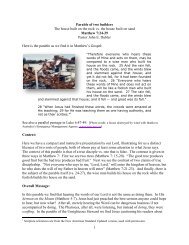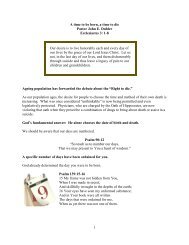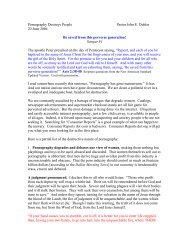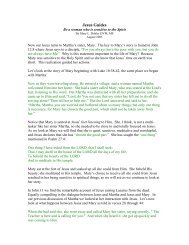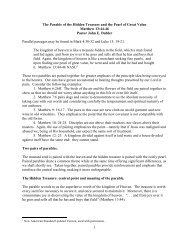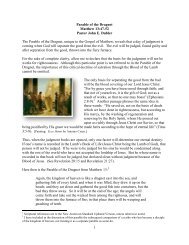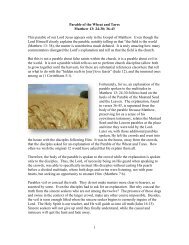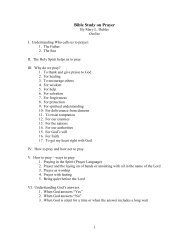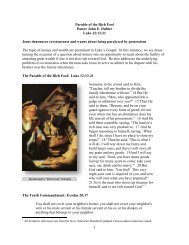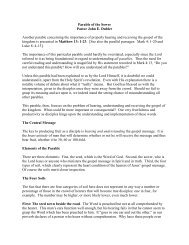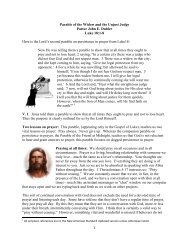1 Parable of the Ten Virgins Matthew 25:1-13 Pastor John E. Dubler ...
1 Parable of the Ten Virgins Matthew 25:1-13 Pastor John E. Dubler ...
1 Parable of the Ten Virgins Matthew 25:1-13 Pastor John E. Dubler ...
- No tags were found...
You also want an ePaper? Increase the reach of your titles
YUMPU automatically turns print PDFs into web optimized ePapers that Google loves.
<strong>Parable</strong> <strong>of</strong> <strong>the</strong> <strong>Ten</strong> <strong>Virgins</strong>Mat<strong>the</strong>w <strong>25</strong>:1-<strong>13</strong><strong>Pastor</strong> <strong>John</strong> E. <strong>Dubler</strong>Be alert and watchful for <strong>the</strong> return <strong>of</strong> <strong>the</strong> LordPrepare for <strong>the</strong> possibility <strong>of</strong> a long delay in <strong>the</strong> return <strong>of</strong> <strong>the</strong> bridegroomLike <strong>the</strong> <strong>Parable</strong> from <strong>the</strong> Fig Tree, this parable instructs us to be watchful and on <strong>the</strong> alert forJesus‟ coming. However unlike <strong>the</strong> Fig Tree, <strong>the</strong> <strong>Parable</strong> <strong>of</strong> <strong>the</strong> <strong>Ten</strong> <strong>Virgins</strong> teaches us to beprepared for <strong>the</strong> possibility <strong>of</strong> a long delay in <strong>the</strong> return <strong>of</strong> <strong>the</strong> bridegroom. Both parables tell usthat we will not know in advance <strong>the</strong> day nor <strong>the</strong> hour <strong>of</strong> His return.Although this parable occurs only in Mat<strong>the</strong>w, <strong>the</strong>re are three parables in which Jesus exhorts usto be ready and watchful for His return:1. <strong>Parable</strong> from <strong>the</strong> Fig Tree: Mat<strong>the</strong>w 24:32-422. <strong>Parable</strong> <strong>of</strong> <strong>the</strong> <strong>Ten</strong> <strong>Virgins</strong>: Mat<strong>the</strong>w <strong>25</strong>: 1-<strong>13</strong>3. <strong>Parable</strong> <strong>of</strong> <strong>the</strong> Alert Slaves: Luke 12:35-48 and Mat<strong>the</strong>w 24: 42-51.The <strong>Parable</strong> <strong>of</strong> <strong>Ten</strong> <strong>Virgins</strong>, Mat<strong>the</strong>w <strong>25</strong>:1-<strong>13</strong>1 Then <strong>the</strong> kingdom <strong>of</strong> heaven will be comparable to ten virgins, who took<strong>the</strong>ir lamps and went out to meet <strong>the</strong> bridegroom. 2 Five <strong>of</strong> <strong>the</strong>m were foolish,and five were prudent. 3 For when <strong>the</strong> foolish took <strong>the</strong>ir lamps, <strong>the</strong>y took nooil with <strong>the</strong>m, 4 but <strong>the</strong> prudent took oil inflasks along with <strong>the</strong>ir lamps. 5 Now while<strong>the</strong> bridegroom was delaying, <strong>the</strong>y all gotdrowsy and began to sleep. 6 But at midnight<strong>the</strong>re was a shout, “Behold, <strong>the</strong> bridegroom!Come out to meet him.” 7 Then all thosevirgins rose and trimmed <strong>the</strong>ir lamps. 8 Thefoolish said to <strong>the</strong> prudent, “Give us some <strong>of</strong>your oil, for our lamps are going out.” 9 But<strong>the</strong> prudent answered, “No, <strong>the</strong>re will not beenough for us and you too; go instead to <strong>the</strong>dealers and buy some for yourselves.” 10And while <strong>the</strong>y were going away to make <strong>the</strong>purchase, <strong>the</strong> bridegroom came, and thosePhoto by Gavin Finley, MDas it appears in his article,“The End-Time Revival,”endtimepilgrim.orgwho were ready went in with him to <strong>the</strong>wedding feast; and <strong>the</strong> door was shut. 11 Later <strong>the</strong>o<strong>the</strong>r virgins also came, saying, “Lord, lord, openup for us.” 12 But he answered, “Truly I say to1
And Jesus said to <strong>the</strong>m, “The attendants <strong>of</strong> <strong>the</strong> bridegroom cannot mourn aslong as <strong>the</strong> bridegroom is with <strong>the</strong>m, can <strong>the</strong>y? But <strong>the</strong> days will come when<strong>the</strong> bridegroom is taken away from <strong>the</strong>m, and <strong>the</strong>n <strong>the</strong>y will fast.” Mat<strong>the</strong>w9:15.The meaning <strong>of</strong> oilMuch has been made <strong>of</strong> what <strong>the</strong> oil means. Some say that <strong>the</strong> oil is indicative <strong>of</strong> good works.We cannot enter into <strong>the</strong> wedding feast without good works to go with our faith. I would findtremendous problems with this view as <strong>the</strong> five foolish virgins are refused entry, even when <strong>the</strong>yreturn with <strong>the</strong> oil <strong>of</strong> good works, and have <strong>the</strong> terror <strong>of</strong> hearing <strong>the</strong>bridegroom say, “Truly I say to you, I do not know you.” Surelythis view is untenable. [Photo: Oil lamp and flask set as advertised onbiblelandshop.net.]O<strong>the</strong>rs assert that <strong>the</strong> oil represents <strong>the</strong> Holy Spirit. After all, oil isra<strong>the</strong>r consistently presented in scripture as an emblem for <strong>the</strong> HolySpirit. There are fewer problems with this view, although it seemslogical that anyone with <strong>the</strong> oil <strong>of</strong> <strong>the</strong> Spirit to any degree or in any quantity is <strong>the</strong>refore, bydefinition, saved. An unsaved person cannot receive <strong>the</strong> Spirit at all.I will ask <strong>the</strong> Fa<strong>the</strong>r, and He will give you ano<strong>the</strong>r Helper, that He may be withyou forever; that is <strong>the</strong> Spirit <strong>of</strong> truth, whom <strong>the</strong> world cannot receive, becauseit does not see Him or know Him, but you know Him because He abides withyou and will be in you. <strong>John</strong> 14:16-17.Remember also that “<strong>the</strong>ir lamps were going out,” (not “gone out” as erroneously translated in<strong>the</strong> KJV). A flickering lamp is lamentable, but it is still a lamp alight and may be salvaged withmore oil. And yet when <strong>the</strong> five unwise virgins return after going to <strong>the</strong> dealer and acquiringmore oil <strong>the</strong>y are refused entry. Again, <strong>the</strong>y hear <strong>the</strong> bridegroom say, “Truly I say to you, I donot know you.” If Jesus <strong>the</strong> Bridegroom does not know a person, that person cannot, bydefinition, be saved.Therefore <strong>the</strong> oil equals Holy Spirit equation presents a true Gordian Knot. One cannot be savedand hear <strong>the</strong> Lord say, “I do not know you,” and one cannot have received <strong>the</strong> Holy Spiritwithout being saved. Here is a dilemma indeed.Lack <strong>of</strong> oil as a lack <strong>of</strong> preparationA better solution can be derived if we remember to start with <strong>the</strong> conclusion—this is a parableabout preparation, especially in anticipating a long delay. We can let <strong>the</strong> oil be a sign <strong>of</strong> thatpreparation and do no damage to ei<strong>the</strong>r <strong>the</strong> parable, nor to o<strong>the</strong>r scripture.Therefore <strong>the</strong> lack <strong>of</strong> oil on <strong>the</strong> part <strong>of</strong> <strong>the</strong> foolish is not lack <strong>of</strong> good works or <strong>the</strong> Holy Spiritbut a lack <strong>of</strong> preparation for a delay. Keeping in mind that <strong>the</strong> entire parable hinges on <strong>the</strong> delay<strong>of</strong> <strong>the</strong> bridegroom we find a simple statement illustrated in <strong>the</strong> lack <strong>of</strong> oil: The foolish did notanticipate <strong>the</strong> eventuality <strong>of</strong> a delay on <strong>the</strong> part <strong>of</strong> <strong>the</strong> bridegroom but <strong>the</strong> wise did.3
The 10 virginsNot unlike <strong>the</strong> problem <strong>of</strong> oil and what it represents, <strong>the</strong>re are various views <strong>of</strong> <strong>the</strong> ten virgins<strong>the</strong>mselves.In one view, <strong>the</strong> ten virgins are a class representing <strong>the</strong>Bride <strong>of</strong> Christ herself, ra<strong>the</strong>r than bridesmaids.However, given what we know <strong>of</strong> wedding traditions <strong>of</strong><strong>the</strong> day, it would not be likely for <strong>the</strong> Lord to speak <strong>of</strong> aman marrying ten virgins. The gentiles <strong>of</strong> His daycertainly practiced polygamy, but not Jews. Jesus‟rebuke <strong>of</strong> <strong>the</strong> Pharisees in regard to marriage was notaimed at polygamy but <strong>of</strong> <strong>the</strong>ir practice <strong>of</strong> serialmarriage. The Pharisees asked, “Is it lawful for a man todivorce his wife for any reason at all?” Mat<strong>the</strong>w 19:3.Jesus‟ response upheld what God intended from <strong>the</strong>beginning: One man; one woman. All <strong>of</strong> this to say thatit is certainly unwieldy to assume <strong>the</strong> ten virginsrepresent <strong>the</strong> Bride <strong>of</strong> Christ. Besides, <strong>the</strong>n we have adivided bride class when five are refused entry into <strong>the</strong>wedding feast.In a second view, <strong>the</strong> ten virgins are all Christians. The five wise virgins are <strong>the</strong> Bride <strong>of</strong> Christbut <strong>the</strong> five foolish virgins are, while still believers, are not admitted to <strong>the</strong> wedding feast andendure <strong>the</strong> great tribulation period on earth. This view faces <strong>the</strong> same dilemma as <strong>the</strong> foolishvirgins having some but not enough oil. How can <strong>the</strong>y be believers and yet hear <strong>the</strong> Lord say, “Ido not know you”?But again, if we focus on <strong>the</strong> message <strong>of</strong> <strong>the</strong> parable, <strong>the</strong> interpretation <strong>of</strong> who <strong>the</strong>se virginsrepresent becomes more tightly focused. Let us assume that all ten virgins are attendants <strong>of</strong> <strong>the</strong>bride or bride‟s maids, waiting for <strong>the</strong> bridegroom to return and <strong>the</strong> wedding feast to begin. Thiswould be consistent with what we know <strong>of</strong> weddings <strong>of</strong> Jesus‟ day: There is a procession to <strong>the</strong>home <strong>of</strong> <strong>the</strong> bride after dark. The bridegroom and his companions come for bride who is withher companions waiting in <strong>the</strong> house. Once <strong>the</strong> procession arrives at <strong>the</strong> bride‟s house, she andher companions leave with <strong>the</strong> bridegroom and join those in <strong>the</strong> procession to <strong>the</strong> wedding feast.But in <strong>the</strong> parable a wrinkle is presented: The bridegroom delays his coming. As <strong>the</strong>y wait adifference in <strong>the</strong> readiness <strong>of</strong> <strong>the</strong> ten virgins is exposed. Before we look at that difference it isgood to observe <strong>the</strong> similarities: They all have lamps and at least some oil. They all expect tomeet <strong>the</strong> bridegroom when he comes and all are waiting for him. They all get drowsy and beginto sleep, and <strong>the</strong>y are all awakened by <strong>the</strong> midnight cry. So far <strong>the</strong>y are equal.What <strong>the</strong> ten virgins do not have in common is extra oil. The wise virgins, anticipating <strong>the</strong>possibility <strong>of</strong> a delay, have brought extra oil with <strong>the</strong>m in flasks. Thus in taking <strong>the</strong> view <strong>of</strong>4
virgins as bridesmaids, five properly prepared and five not prepared <strong>the</strong> parable refocuses onpreparation for <strong>the</strong> Lord‟s return and not who is a virgin and what is <strong>the</strong> significance <strong>of</strong> oil.The wise are unable to help <strong>the</strong> foolishThe foresight <strong>of</strong> preparation by <strong>the</strong> wise virgins, (that is those who properly prepared for <strong>the</strong>coming <strong>of</strong> <strong>the</strong> Lord), is not transferrable to o<strong>the</strong>rs. Their preparedness cannot be shared. Thoseexpecting <strong>the</strong> Lord‟s return were ei<strong>the</strong>r prepared or not. At <strong>the</strong> very moment <strong>of</strong> <strong>the</strong> bridegroom‟sarrival, <strong>the</strong> foolish finally saw <strong>the</strong> need <strong>of</strong> being properly prepared, but it was too late. By <strong>the</strong>time <strong>the</strong>y returned with extra oil, <strong>the</strong> door had already been shut.Good intentions are not enoughCertainly <strong>the</strong>re is a stark message in this parable for our times. One is ei<strong>the</strong>r prepared for <strong>the</strong>return <strong>of</strong> <strong>the</strong> Lord, including anticipating <strong>the</strong> possibility <strong>of</strong> delay or he is not. If one is notprepared, let him prepare. If he is prepared, let him keep alert and watchful. There is no excusefor not being ready. Our good intentions are not enough. Knowing that <strong>the</strong> Lord will return isnot enough. Good intentions must be converted into good preparations.The wedding feast proceeds without <strong>the</strong> foolish virginsKeeping in mind that <strong>the</strong> parable is about preparation and readiness, it is easy to see that thosewho are not ready and prepared will be left behind. When <strong>the</strong> Lord returns we will find peoplewho started out waiting for His coming, but in <strong>the</strong> end were unprepared. We notice a similar<strong>the</strong>me in Mat<strong>the</strong>w 7:21-23, “Not everyone who says to Me, „Lord, Lord,‟ will enter <strong>the</strong> kingdom<strong>of</strong> heaven, but he who does <strong>the</strong> will <strong>of</strong> My Fa<strong>the</strong>r who is in heaven will enter. Many will say toMe on that day, „Lord, Lord, did we not prophesy in Your name, and in Your name cast outdemons, and in Your name perform many miracles?‟ And <strong>the</strong>n I will declare to <strong>the</strong>m, „I neverknew you; depart from me, you who practice lawlessness.‟”Notice that <strong>the</strong>re is a point at which <strong>the</strong> last minute scurry to prepare is simply too late. This canbe seen in <strong>the</strong> parable in this sentence, “And while <strong>the</strong>y were going away to make <strong>the</strong> purchase,<strong>the</strong> bridegroom came, and those who were ready went in with him to <strong>the</strong> wedding feast; and <strong>the</strong>door was shut.”The consequences <strong>of</strong> not being ready are immense. The bridegroom in <strong>the</strong> parable says, “I donot know you,” when <strong>the</strong>y come and knock. The parable is told to alert us to <strong>the</strong> need to beready, watchful and prepared. No one knows when <strong>the</strong> Lord Jesus will return. We can expectanything from immediacy to lengthy delays. Being spirituallyready is <strong>the</strong> key. And as <strong>the</strong> Lord Himself concludes:Be on <strong>the</strong> alert <strong>the</strong>n, for you do not know <strong>the</strong> day nor <strong>the</strong> hour.5



